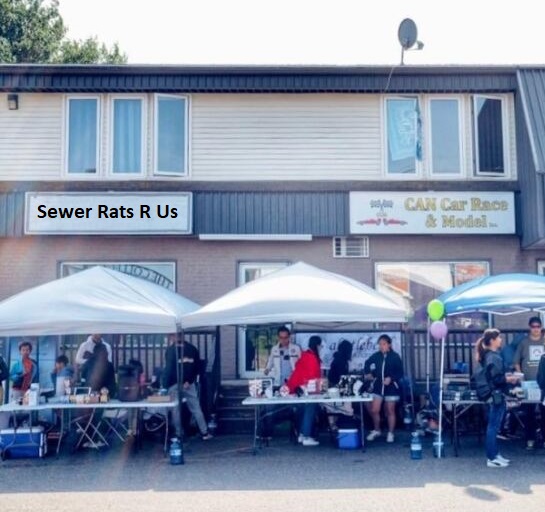A Lesson in Markets and Bureaucracies: The Very Instructive History of Rat Farms
October 22, 2022
In effect, authorities created two rat farms, both unintended: the sewers, and the private-sector rat-farms.
The history of Rat Farms offers a valuable lesson in how markets and bureaucracies work.
The story of how the colonial authorities in Hanoi came to establish two kinds of rat farms is highly instructive.
The first rat farm was unintentional. French colonial authorities decided to modernize the French Quarter of Hanoi
(where Westerners lived) by constructing a modern sewer system, the overall goal being to establish
"a little Paris in the East."
Their understanding of sewers was limited to the first-order effects: sewers safely collected and disposed
of human waste.
They did not anticipate the second-order effect: the sewer was Rat Paradise, as "the pipes offered rats a
new ecological niche, free of predators and full of food."
Second-order effects generate unintended consequences. (First-order effects: actions have consequences.
Second-order effects: consequences have their own consequences.)
Rats proliferated in the sewers and began roaming the streets of Hanoi--not exactly the results intended by
the authorities.
Matters became worse when in 1902 a first case of bubonic plague was detected. Modernity had created a
potential health crisis.
To combat the exploding rat population, authorities hired crews to enter the sewers and kill the rats--
unpleasant and hazardous work.
Despite killing thousands of rats per day, the rats' tremendous fertility was more than a match for
the extermination crews.
In an effort to recruit the local populace as rat-catchers / killers, the authorities offered the
public a bounty for every dead rat, and later on for every rat-tail when the pile of rats waiting
to be incinerated became too high.
Authorities then noticed tail-less rats around Hanoi: residents caught the rats, cut off their tails,
and then freed them to continue breeding to insure a steady supply of profitable rat-tails.
Once again, authorities had failed to consider second-order effects.
The authorities soon discovered the ultimate manifestation of the perverse incentives the bounty had created:
rat-farms had been established around Hanoi by private-sector entrepreneurs to maximize the harvesting of profitable rat-tails.
In effect, authorities created two rat farms, both unintended: the sewers, and the private-sector rat-farms.
Perverse incentives and unintended consequences are, like rats, ever-present.
In 1998, the Vietnamese authorities closed restaurants selling cat meat, which was marketed as
"little tiger meat", because they thought that if the cat population decreased, rats would invade
the rice fields, showcasing a similar mentality to the French almost a century earlier.
The modern iterations of perverse incentives and unintended consequences generally follow this line of development:
1. Massive new funding is made available to address a pressing problem: higher education, healthcare, homelessness,
intelligence-gathering, national defense, etc.
2. This massive influx of new funding creates a new ecological niche free of predators and full of food,
enabling the explosive growth of administrators, support staff, consultants and con-artists, all of whom
have zero incentive to actually solve the problem and every incentive to expand the problem so their
protected Paradise gets more funding.
This is higher education, healthcare, homelessness, intelligence gathering and national defense in a nutshell.
Sources:
Great Hanoi Rat Hunt, The: Empire, Disease, and Modernity in French Colonial Vietnam (book review)
Great Hanoi Rat Massacre (wikipedia)

A version of this essay was first published as a weekly Musings Report sent exclusively to subscribers and
patrons at the $5/month ($50/year) and higher level. Thank you, patrons and subscribers, for
supporting my work and free website.
 My new book is now available at a 10% discount ($8.95 ebook, $18 print):
Self-Reliance in the 21st Century.
My new book is now available at a 10% discount ($8.95 ebook, $18 print):
Self-Reliance in the 21st Century.
Read the first chapter for free (PDF)
Read excerpts of all three chapters
Podcast with Richard Bonugli: Self Reliance in the 21st Century (43 min)
My recent books:
The Asian Heroine Who Seduced Me
(Novel) print $10.95,
Kindle $6.95
Read an excerpt for free (PDF)
When You Can't Go On: Burnout, Reckoning and Renewal
$18 print, $8.95 Kindle ebook;
audiobook
Read the first section for free (PDF)
Global Crisis, National Renewal: A (Revolutionary) Grand Strategy for the United States
(Kindle $9.95, print $24, audiobook)
Read Chapter One for free (PDF).
A Hacker's Teleology: Sharing the Wealth of Our Shrinking Planet
(Kindle $8.95, print $20,
audiobook $17.46)
Read the first section for free (PDF).
Will You Be Richer or Poorer?: Profit, Power, and AI in a Traumatized World
(Kindle $5, print $10, audiobook)
Read the first section for free (PDF).
The Adventures of the Consulting Philosopher: The Disappearance of Drake (Novel)
$4.95 Kindle, $10.95 print);
read the first chapters
for free (PDF)
Money and Work Unchained $6.95 Kindle, $15 print)
Read the first section for free
Become
a $1/month patron of my work via patreon.com.
NOTE: Contributions/subscriptions are acknowledged in the order received. Your name and email remain confidential and will not be given to any other individual, company or agency.
|
Thank you, Crochead ($100), for your outrageously generous contribution to this site -- I am greatly honored by your steadfast support and readership. |
Thank you, Brian M. ($10), for yet another wondrously generous contribution to this site -- I am greatly honored by your steadfast support and readership. |

|